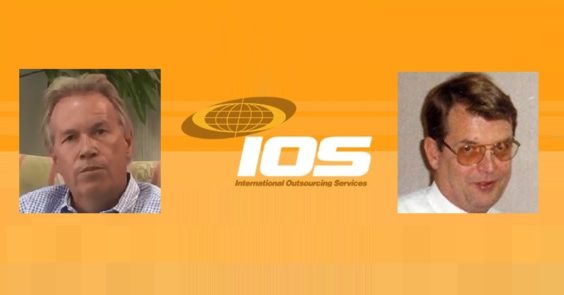
UPDATE: Just as the case began, it was delayed yet again after defendant Chris Balsiger was hospitalized with chest pains early Tuesday, the day that opening arguments were set to start. The judge initially continued the case until Monday, then later rescheduled the trial to begin on October 3rd.
A quarter-billion dollar coupon fraud case nearly a decade in the making, is finally going to trial. Following the completion of jury selection yesterday, the government’s case against former coupon executives Chris Balsiger and James Currey gets under way in a Wisconsin federal courtroom today.
Coupon fraud charges against consumers who misuse or falsify coupons are not uncommon. But this case is the largest of its kind that implicates coupon industry professionals, who allegedly conspired to commit coupon fraud on a grand scale – from the inside.
Balsiger (pictured above, at left) is the former CEO of International Outsourcing Services, once the country’s largest coupon processor. IOS served as the middle man, collecting coupons from retailers and securing reimbursement from manufacturers. Currey (pictured at right) was chairman of a company that provided information technology services to IOS. Together, government prosecutors allege, the two men conspired with nine others to cheat manufacturers out of some $250 million by falsely submitting coupons for reimbursement that were never used by consumers at all.
And all it took, investigators said, was a spin in a cement mixer to make mint-condition coupons look sufficiently “used”.
The government secured a 27-count criminal indictment back in 2007, charging eleven former IOS executives and associates with wire fraud and conspiracy to obstruct justice. Balsiger is accused of concocting a scheme, supported and carried out by his co-defendants, to get manufacturers to pay for millions of coupons that they might otherwise have flagged for rejection. Investigators said coupons that might have looked suspicious if submitted by smaller, independent grocery stores were mixed in with coupons redeemed at large chain supermarkets, without those retailers’ knowledge. Many of the coupons, prosecutors allege, “actually had been submitted by coupon brokers who simply cut coupons in bulk from newspaper inserts and never purchased products.”
Prosecutors say Balsiger “came up with the idea in 2000 and presented it, using color-coded charts,” which “Currey characterized as ‘brilliant’.” But eventually, several manufacturers noticed that they were getting coupon submissions from stores that didn’t even sell their products, or from stores in one part of the country when the coupons were only distributed in another part of the country.
And that’s when the alleged scheme began to unravel.
The government intends to show that Balsiger and Currey not only carried out the plot to defraud manufacturers, but encouraged and pressured others to lie to federal investigators once they started asking questions.
The defendants claim the operation was not an intent to defraud anyone – it was just an internal invoicing system designed to prevent manufacturers from denying legitimate coupons from smaller retailers. “Our clients wanted it. They weren’t getting paid,” Balsiger was quoted as saying in an internal memo. “We own these coupons,” he added. “They are our property and our mission was to get paid.”
Balsiger accuses the government of conspiring with his competitors “to fabricate a false indictment against IOS,” and he has vowed to expose the coupon industry as a “lying, cheating, dirty business.”
“Balsiger purportedly plans to ‘put the industry on trial’ in support of an argument that because manufacturers, redemption agents, and retailers may have engaged in wrongdoing over the years without being charged, the jury should acquit him,” prosecutors said ahead of the trial. “Balsiger’s apparent defense is similar to someone trying to fight a speeding ticket by presenting evidence that his neighbors also have driven over the speed limit.”
In the nine years it’s taken for the case to go to trial, nine of the eleven defendants have pleaded guilty, including former IOS consultant Howard McKay just last month. Several of them are expected to testify against their two former co-workers. The government also plans to introduce evidence from a long list of exhibits that includes “cement mixer video,” crates of whole coupon inserts and cut coupons seized from the home of an IOS client, and an internal IOS memo titled “Changes to Coupon Programs to Avoid Manufacturer Inquiries.”
Balsiger and Currey plan to introduce testimony from a list of dozens of potential witnesses that reads like a who’s who of the coupon industry – the heads of industry groups like the Coupon Information Corporation and the Association of Coupon Professionals, current and former executives from rival coupon processing companies, former IOS employees, and plenty of character witnesses from outside the industry.
The trial is expected to last four to five weeks, and the government says a verdict can’t come soon enough. “The defendants have successfully delayed this trial for the better part of a decade,” prosecutors said last week. All parties involved now “have an interest in closure.”
Whenever the trial ends, and whatever the verdict, manufacturers still have a civil case pending against Balsiger and the others, in an effort to get some of their $250 million back. So, despite how long it’s already taken this case to make it to trial – a verdict in this complicated, long-delayed case may turn out to be just the beginning.












Popcorn is popped and ready. Comfy clothes, check.
Come on, Balsiger, sing. Tell us all your dirty deeds. Tell us every shady thing you know about the coupon industry.
(Reminds me of Chappelle: “Why is Bush so certain Iraq had WMDs? Because he still has the receipt.”)
Not trying to inject politics here. Just hoping Balsiger spills his guts. I got my notepad out and everything. We are ready, Mr. Balsiger.